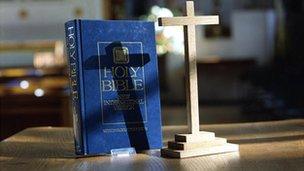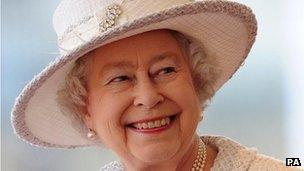Politicians vs clergy? Row grows over church and state
- Published
- comments

Some MPs and bishops are increasingly at odds over mixing religion with politics
"Perhaps the bishops should give up politics for Lent."
The then Trade Minister and MP for Coventry South West, the late John Butcher, landed himself in the middle of an unholy row when he tried to make light of attacks on the Thatcher government's economic policies by leading figures in the Church of England.
But 30 years on there are signs the tide of public opinion may be turning his way.
The recent Ipsos Mori, external poll, commissioned by the foundation bearing the name of the high priest of atheism, Professor Richard Dawkins, external, suggests three-quarters of people who profess to be Christians believe religion should not influence public policy.
And almost 500 years after the Church of England became the established church in its present form almost half of them, 46%, think religion should be separate from the state.
Unholy row
The argument intensified when the lords spiritual, the Anglican bishops in the Upper House, opposed the government's welfare benefits cap.
Some newspaper leader writers quoted Henry II from nearly 900 years ago: "Who will rid me of this turbulent priest?", heralding the assassination of the Archbishop of Canterbury Thomas a Becket.
No one is suggesting any of today's senior bishops should pay the ultimate price!
But the court ruling against prayers as an agenda item for council meetings has undoubtedly sharpened the argument surrounding the secularisation of our society and its politics.
Not least among the politicians themselves...
The Conservative MP for Stafford, Jeremy Lefroy, external, is a practising Christian.
BBC Radio Stoke's political reporter, Elizabeth Glinka, accompanied him to a church service in his constituency where he told her he supported the bishops' right to get involved despite their criticisms of the government:
"It is appropriate that they should have their say. Even though we may not always agree with them, they do represent a wider view of society."
But Cllr Deirdre Alden, the Conservative chairwoman of Birmingham City Council's health scrutiny committee startled fellow councillors recently with some scathing criticisms of the city's bishop, the Rt Rev David Urquhart, who frequently sits in the Lords.
Cllr Alden said that instead of chairing the newly established Be Birmingham, external commission on social inclusion, he should concentrate instead on "the moral decline of Birmingham's feral underclasses and falling congregations".
Many faiths
No one can dispute that many churches face an uphill fight to reverse declining numbers.
Birmingham has the youngest age profile of any city in Europe. Its ethnic minorities will soon, together, be a minority no longer.
I wonder if the age-old, polarised, debate about religion and politics may soon be consigned to history.

Recently the Queen stressed that the Church of England helps the free practice of all faiths
The sovereign may be the Defender of the Faith; i.e. the established Anglican Church of England.
But she sounded very much in tune with the notion, first presented by her son and heir, Prince Charles, of a Defender of Faiths (plural) when she said recently:
"The concept of our established church is occasionally misunderstood... gently and assuredly the Church of England helps the free practice of all faiths in this country."
Some commentators interpreted this as a polite nudge to church leaders: a suggestion that if they do not make constructive contributions to the debate about secularisation, the perception will get about that they have nothing to say.
These will be among our talking points on this week's Sunday Politics.
I will be joined in the studio by
Owen Paterson, external, the Conservative MP for North Shropshire and Secretary of State for Northern Ireland
Baroness Morris of Yardley, external: as Estelle Morris she was the Labour MP for Birmingham Yardley for 13 years, during which time she served as Secretary of State for Education, Employment and Skills.
And I hope you will join me too at the earlier time of 11.30 on BBC One on Sunday, 4 March 2012.
Follow me on Twitter: PatrickBurnsBBC, external